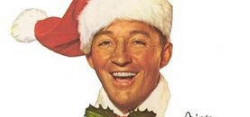This opinion article was first published on CLUAS in December 2004
CLUAS Opinion
Novelty, Sentimentality, Charity...
 In
the 5th CLUAS Opinion piece,
Kierry decides it's time we went a bit seasonal and so takes us on a brief
history of the Christmas charts...
In
the 5th CLUAS Opinion piece,
Kierry decides it's time we went a bit seasonal and so takes us on a brief
history of the Christmas charts...
Well, here it is, Christmas, the Silly Season. The time of year when people
put aside their taste and dignity to cover their house in gaudy tinsel and
annoying, flickering lights. It is a time when people feel those most beautiful
human emotions: guilt, obligation and stress. A time when Mr. Blobby can outsell
everything else to get to Number One and no, I'm not talking about Louis Walsh.
I'm talking about novelty records, comedy songs, and simply terrible music. How
can so many people spend their hard earned cash on crap that they will probably
never listen to again? Maybe never even listen to at all? Band Aid 20, I'm
looking at you. I think we're all aware that the public doesn't know what's good
for them, just look at Pop Idol and other shows of that ilk. I mean, does anyone
really sit down with a brandy and a "Cliff's Greatest Hits" compilation? Where
did it all go wrong?
Well, it wasn't always this way. Ever since Al Martino had the first British
Christmas Number One in 1952 with "Here In My heart" there have been some
classic songs at the top on December 25th including four Beatles tunes, "I Want
To Hold Your Hand", "I Feel Fine", "Day Tripper" and "Hello Goodbye" all made it
to Number One. Everything was going fine until 1969, and a certain Mr. Rolf
Harris. The first ever novelty record to hit the Christmas Number One "Two
Little Boys" arrived, and brought with it the notion that to sell lots of
records and make loads of money you didn't have to have a great song. The
floodgates had opened, never to be closed. Shortly afterwards, in 1971, Benny
Hill took the Number One at Christmas with "Ernie, The Fastest Milkman In The
West". Other terrible songs like "Long Haired Lover From Liverpool" soon
followed to occupy the top of the charts like tuneless angels on a Christmas
tree. In 1973 the first of the big seasonal songs arrived. "Merry Xmas
Everybody" was Number One for five weeks from the beginning of December, and
would keep Slade in furry boots and dodgy haircuts for life. The next year
delivered Mud's "Lonely this Christmas" and from then on the festive charts have
been dominated by novelty, eccentricity and just plain creepy. For example
"There's No-one Quite Like Grandma" by St Winifred's School choir, bless them,
in 1980; possibly the worst song ever to reach Number One, let alone the saintly
Christmas peak.
In the Eighties record companies had begun to realize the potential of this
yearly goldmine and the labels began scheduling specifically for December to
ensure maximum sales. Greatest hits packages began to appear, first on 8-track
and then on cassette. A big seller at Christmas could make wallets bulge, and
everyone sat up and took notice. Midge Ure and Bob Geldof certainly did and, in
1984, a motley crew of singers, musicians and Phil Collins recorded and released
"Do They Know It's Christmas", the most successful charity single ever. They did
it again in 1989, with a watered-down line up, making it the only song to go
straight into the Christmas Number One spot twice. Odds are on that it'll be
Number One again this year, which isn't bad for a song so wet from sentiment.
Speaking of wet from sentiment, we come neatly to Cliff Richard. Cliff is
another tradition retrieved from the attic and dusted down around this time of
year, with three Christmas Number Ones in the December Top Ten. Sir Cliff seems
to do well with Christian ballads, like "Saviors Day" and "Millennium Prayer", which just missed out on Number One in Britain and Ireland in 2000, as well as
soppy stuff like "Mistletoe and Wine" and "I Love You".
So, considering that Cliff, Band Aid, Michael Jackson's "Earth Song", "Stay
Another Day" by East 17 and "I Will Always Love You" by Whitney Houston were all
found in millions of stockings in the Nineties, is it sentimental stuff that
people buy" perhaps putting the word "Christmas" in the title works? Band Aid
did it, Dickie Valentine's "Christmas Alphabet" did it, as did the
aforementioned Mud, even Shakin' Stevens did it, wishing "Merry Christmas
Everyone". This tactic didn't work for The Vandals however, as their singles "My
First Xmas (As A Woman)" and "Christmas Time For My Penis" tragically, never
troubled the Christmas charts. It also didn't help Run DMC's 1987 attempt to
crack the Yuletide market "Christmas In Hollis", which informed us that "the
rhymes you hear are the rhymes of Darryl's / but each and every year we bust
Christmas carols".
It's not all bad though. "Another Brick In The Wall" was a Christmas Number One,
as was "Bohemian Rhapsody", twice. For their fan club every year REM release a
cover of a different Christmas classic, and you won't pay less than $100 on
E-Bay for any of them. No self respecting soul man would be without James
Brown's Legendary "Funky Christmas", which contains such classics as "Santa! Go
Straight To The Ghetto" at this time of year and, if you're treating yourself,
you could do worse than getting a copy of "Christmas" by Low.
So what have we learned kids? Well, perhaps we now know that novelty, charity
and sentimental songs dominate the Christmas charts, and that taste, like snow,
is rarely seen. At least we'll always have those traditional Carols, "Fairytale
Of New York" and "White Christmas". Hmm, maybe it's not so bad after all...
Have a Merry, Funky Christmas!
Kierry
![]() Discuss this article on the CLUAS
discussion board.
Discuss this article on the CLUAS
discussion board.
Previous CLUAS Opinion pieces...
| Dateline: January 2006 | |
|
|
|
| Dateline: December 2005 | |
|
|
|
|
What Pop Music Can Teach Us About The Spirit Of Christmas... |
Dateline: December 2005 |
|
|
|
| Dateline: December 2005 | |
|
|
|
|
Homosexuality in pop music and the taboos that still surround it... |
Dateline: September 2005 |
|
|
|
| Dateline: June 2005 | |
|
|
|
| Dateline: May 2005 | |
|
|
|
| Dateline: March 2005 | |
|
|
|
| Dateline: February 2005 | |
|
|
|
| Dateline: January 2005 | |
|
|
|
| Dateline: December 2004 | |
|
|
|
| Dateline: November 2004 | |
|
|
|
| Dateline: October 2004 | |
|
|
|
| Dateline: October 2004 | |
|
Roddy Doyle said recently in an interview in The Guardian that Ireland doesn't produce great musicians. Considering that he is currently promoting a novel centred on Louis Armstrong and American jazz, it's possible that he may have been quoted out of a very broad context. Nonetheless, he has a valid point. Read the full article... |
|













